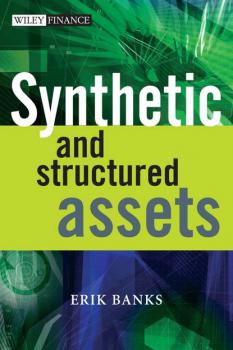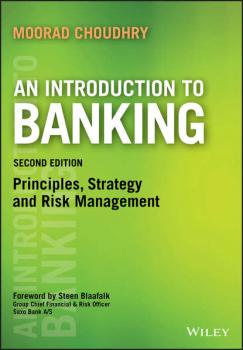Группа авторов
Список книг автора Группа авторовSynthetic and Structured Assets
Organized along product lines, the book will analyze many of the original classes of structured assets, including mortgage- and asset-backed securities and strips, as well as the newest structured and synthetic instruments, including exchange-traded funds, credit derivative-based collateralized debt obligations, total return swaps, contingent convertibles, and insurance-linked securities. Two introductory chapters will outline the scope of the market, key definitions, participant motivations/goals, economics of structuring and synthetic replication, and the central «building blocks» used in the creation of synthetic/structured assets (including on-balance sheet assets and liabilities, derivatives, shelf registration debt programs, private placements, trusts, and special purpose entities). Eight product chapters will then examine the main instruments of the marketplace: mortgage- and asset-backed securities, stripped/reconstituted government securities, collateralized debt obligations, structured notes, insurance-linked securities, exchange-traded funds, convertible bond variations, and derivatives/synthetic asset replication. Each product chapter will contain product descriptions, structural features (e.g., trading conventions, settlement), arbitrage/investment drivers, and various worked examples and diagrams that emphasize practical investment and risk applications; financial mathematics will be kept to a minimum. A concluding chapter will review the essential risk, legal, regulatory, and accounting features of synthetic and structured assets in the world's major markets.
International Real Estate Handbook
This book presents a comprehensive reference for real estate investors everywhere. Covering the unique real-estate situations in seventeen key countries, including the United States and Europe, it offers a unique international overview of the real estate market.
Selling Your IT Business
For close to twenty years I have observed Mr. Chalfin helping owners, business advisors, and students get a grip on the slippery issues of selling a business. This book is a valuable distillation of his expertise. –Ian MacMillan, Dhirubhai Ambani Professor of Innovation and Entrepreneurship The Wharton School, University of Pennsylvania «Bob provided us with valuable outside perspective while we prepared our business for sale and during the sale process. His book is an excellent guideline for business owners thinking about selling their company.» –Steve Gerlicher, Entrepreneur «Bob Chalfin's experience and intellect make this book essential reading for IT business owners. Provides thoughtful analysis and practical advice invaluable to anybody who is even considering selling their business.» –Louis W. Fryman, Esq. Chairman Emeritus Fox Rothschild LLP «Bob Chalfin brings unparalleled experience to developing and executing these transactions. His insights are tempered by years of formulating these deals and then describing the methods to hundreds of students at The Wharton School.» –Stephen M. Sammut Senior Fellow, Wharton Entrepreneurial Programs Managing Director, Burrill International «This book covers all the bases for someone selling an IT (or really any) business. The observations on buyer motivations are particularly insightful.» –Mark Goodwin Executive Vice President and Chief Operating Officer Pioneer Investments
The Secrets of Facilitation
The Secrets of Facilitation delivers a clear vision of facilitation excellence and reveals the specific techniques effective facilitators use to produce consistent, repeatable results with groups. Author Michael Wilkinson has trained thousands of managers, mediators, analysts, and consultants around the world to apply the power of SMART (Structured Meeting And Relating Techniques) facilitation to achieve amazing results with teams and task forces. He shows how anyone can use these proven group techniques in conflict resolution, consulting, managing, presenting, teaching, planning, selling, and other professional as well as personal situations.
Risk and Security Management
Learn to measure risk and develop a plan to protect employees and company interests by applying the advice and tools in Risk and Security Management: Protecting People and Sites Worldwide. In a world concerned with global terrorism, instability of emerging markets, and hazardous commercial operations, this book shines as a relevant and timely text with a plan you can easily apply to your organization. Find a series of strategic to granular level policies, systems, and concepts which identify and address risk, enabling business to occur in a manner which best protects you and your company.
Valuation for M&A
Determine a company's value, what drives it, and how to enhance value during a M&A Valuation for M&A lays out the steps for measuring and managing value creation in non-publicly traded entities, and helps investors, executives, and their advisors determine the optimum strategy to enhance both market value and strategic value and maximize return on investment. As a starting point in planning for a transaction, it is helpful to compute fair market value, which represents a “floor” value for the seller since it by definition represents a value agreed upon by any hypothetical willing and able buyer and seller. But for M&A, it is more important to compute investment value, which is the value of the target company to a strategic buyer (and which can vary with each prospective buyer). Prepare for the sale and acquisition of a firm Identify, quantify, and qualify the synergies that increase value to strategic buyers Get access to new chapters on fairness opinions and professional service firms Find a discussion of Roger Grabowski's writings on cost of capital, cross-border M&A, private cost of capital, intangible capital, and asset vs. stock transactions Inside, all the necessary tools you need to build and measure private company value is just a page away!
An Introduction to Banking
A practical primer to the modern banking operation Introduction to Banking, Second Edition is a comprehensive and jargon-free guide to the banking operation. Written at the foundational level, this book provides a broad overview of banking to give you an all-around understanding that allows you to put your specialty work into context within the larger picture of your organization. With a specific focus on risk components, this second edition covers all key elements with new chapters on reputational risk, credit risk, stress testing and customer service, including an updated chapter on sustainability. Practical material includes important topics such as the yield curve, trading and hedging, asset liability management, loan origination, product marketing, reputational risk and regulatory capital. This book gives you the context you need to understand how modern banks are run, and the key points operation at all levels. Learn the critical elements of a well-structured banking operation Examine the risk components inherent in banking Understand operational topics including sustainability and stress testing Explore service-end areas including product marketing and customer service Banks continue to be the heart of the modern economy, despite the global financial crisis —they have however become more complex. Multiple layers and a myriad of functions contribute to the running of today's banks, and it's critical for new and aspiring bankers to understand the full breadth of the operation and where their work fits in. Introduction to Banking, Second Edition provides an accessible yet complete primer, with emphasis on the areas that have become central to sustainable banking operation.
Audit and Accounting Guide
With all the recent changes in state and local government audit and accounting, including changes to some of the more complex areas such as pensions and post-employment benefits other than pensions (OPEB), accountants and financial managers can't afford to be without the most current guidance. This authoritative guide provides complete coverage of audit and accounting considerations critical for both preparers and auditors. This edition includes two new schedules: Governmental Employer Participation in Single-Employer Plans: Illustrative Schedule of Pension Amounts and Report; and, Illustrative Notes to Schedule of Employer Allocations and Schedule of Pension Amounts. It also provides insights, comparisons, and best practices for financial reporting and the financial reporting entity, revenue and expense recognition, capital asset accounting, the elements of net position, accounting for fair value, municipal securities offerings, tax abatements and much more.
Cutting Edge Internal Auditing
Cutting Edge Internal Auditing provides guidance and knowledge for every internal auditor, encouraging each to pioneer new ground in the development of their professional practices in all risk management, control and governance processes. Serving as an excellent reference guide that develops a pattern of internal auditing now and for the future, this book explores the concept of 'cutting edge' internal auditing as an imaginative adventure: demonstrating how this has influenced and will continue to influence the development of professionalism in internal auditing. Built on the foundations of Jeffrey Ridley's extensive internal auditing experience across the public and private sectors, the author uses his articles and research to explore and develop the motivations, goals and categories of innovation in internal auditing today. It develops and brings up to date an imaginative internal auditing model, created and used by the author in the early 1980s, drawing on research and guidance by The Institute of Internal Auditors Inc., its Research Foundation and the Institute of Internal Auditors – UK and Ireland. Each chapter stands alone by focusing on an individual internal auditing theme, considered from both the perspective of internal auditing and its customers to suggest an appropriate vision as a goal for every internal audit activity. Each chapter also includes self-assessment questions to challenge the readers understanding of its messages. Companion website contains some of the author's training slides and seventy case studies, many written by leading internal audit practitioners, this book creates a vision for future cutting edge internal auditing.
Sarbanes-Oxley Internal Controls
Sarbanes-Oxley Internal Controls: Effective Auditing with AS5, CobiT, and ITIL is essential reading for professionals facing the obstacle of improving internal controls in their businesses. This timely resource provides at-your-fingertips critical compliance and internal audit best practices for today's world of SOx internal controls. Detailed and practical, this introductory handbook will help you to revitalize your business and drive greater performance.









